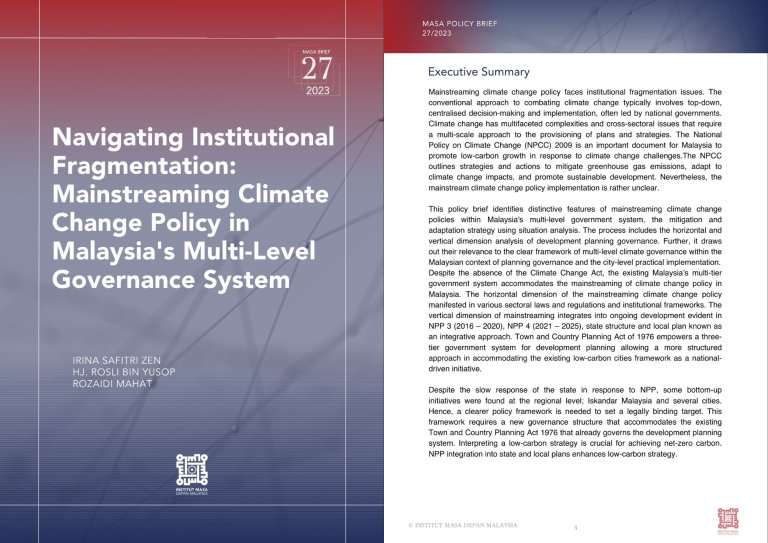Mainstreaming climate change policy faces institutional fragmentation issues. The conventional approach to combating climate change typically involves top-down, centralised decision-making and implementation, often led by national governments. Climate change has multifaceted complexities and cross-sectoral issues that require a multi-scale approach to the provisioning of plans and strategies. The National Policy on Climate Change (NPCC) 2009 is an important document for Malaysia to promote low-carbon growth in response to climate change challenges.The NPCC outlines strategies and actions to mitigate greenhouse gas emissions, adapt to climate change impacts, and promote sustainable development. Nevertheless, the mainstream climate change policy implementation is rather unclear. This policy brief identifies distinctive features of mainstreaming climate change policies within Malaysia’s multi-level government system, the mitigation and adaptation strategy using situation analysis. The process includes the horizontal and vertical dimension analysis of development planning governance. Further, it draws out their relevance to the clear framework of multi-level climate governance within the Malaysian context of planning governance and the city-level practical implementation. Despite the absence of the Climate Change Act, the existing Malaysia’s multi-tier government system accommodates the mainstreaming of climate change policy in Malaysia. The horizontal dimension of the mainstreaming climate change policy manifested in various sectoral laws and regulations and institutional frameworks. The vertical dimension of mainstreaming integrates into ongoing development evident in NPP 3 (2016 – 2020), NPP 4 (2021 – 2025), state structure and local plan known as an integrative approach. Town and Country Planning Act of 1976 empowers a three-tier government system for development planning allowing a more structured approach in accommodating the existing low-carbon cities framework as a national-driven initiative. Despite the slow response of the state in response to NPP, some bottom-up initiatives were found at the regional level; Iskandar Malaysia and several cities. Hence, a clearer policy framework is needed to set a legally binding target. This framework requires a new governance structure that accommodates the existing Town and Country Planning Act 1976 that already governs the development planning system. Interpreting a low-carbon strategy is crucial for achieving net-zero carbon. NPP integration into state and local plans enhances low-carbon strategy.
#27: Navigating Institutional Fragmentation: Mainstreaming Climate Change Policy in Malaysia’s Multi-Level Governance System
- 22 Mar 2024
- Policy Brief, MASA Policy Development Programme
Share Article
More Article
No data was found
